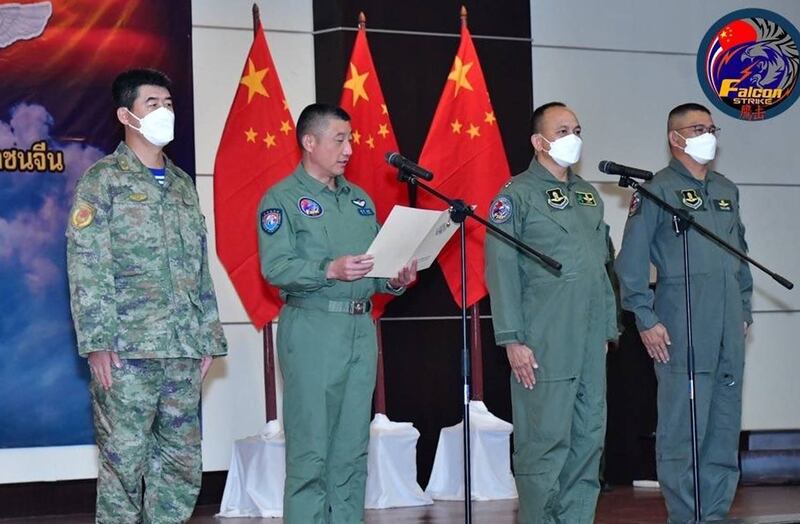The renewed ‘Falcon Strike’ joint air force exercise between Thailand and China will be relocated as of next year from the current site which served as a U.S. air base during the Vietnam War, officials said.
“The joint exercise will be held in Nam Pong air base, Khon Khaen province, for the next two years,” said an air force official, who wished to remain anonymous as they were not authorized to speak to foreign media.
The government in Udon Thani, where the drills started on Sunday and last until next Wednesday, have received numerous complaints from local residents about noise pollution, the official said, adding that the exercise was also “paused for one day” on Thursday and will resume on Friday.
‘Falcon Strike’ joint exercises have been held regularly since 2015 but were suspended in 2020 because of the global COVID-19 pandemic.
This year, China sent six J-10C/S fighter jets, two JH-7A bombers and one Shaanxi KJ-500 airborne early warning and control (AEW&C) aircraft, said the source.
This is the first time that China’s air force has sent its JH-7A fighter-bombers to take part in a ‘Falcon Strike’.
For its part, Thailand deployed five Saab JAS 39 Gripen multi-role fighters, three Alpha Jet attack aircraft, and a Saab 340 AEW&C.
In total, 18 aircraft are taking part in the twice daily drills, and they’re “making a lot of noise,” said the unnamed air force official.
Analysts said the Royal Thai Air Force did not send U.S. made F-16 fighters to the drills as it seeks to buy advanced F-35 aircraft from the U.S.
The exercise includes “training courses such as air support, strikes on ground targets, and small and large-scale troop deployment,” according to China’s defense ministry.

Former U.S. air base
The Udorn Royal Thai Air Force Base, where the drills are being held, was a U.S. Air Force frontline facility from 1964 to 1976 at the peak of the U.S.-Thailand military alliance.
During the Vietnam War, up to 80% of all USAF air strikes over North Vietnam and Laos reportedly originated from air bases in Thailand, according to a U.S. Congressional Record from Nov. 1, 1967.
Since around 2001 Thailand “has tended to follow a foreign policy of hedging or creating balance between the U.S. and China,” said Paul Chambers, a Thailand-based military analyst.
“Especially since the 2006 coup, Thai governments have sought to offset military procurement, joint military exercises, and military training with the two countries,” Chambers told RFA.
“The U.S. will be watching the exercises but will view them understanding Thailand’s hedging policy,” he added.
Since the Thai military increased its power after coups in 2006 and 2014, Bangkok bought tanks, armored personnel carriers and entered into a controversial multi-billion-dollar contract to procure submarines from China.
China’s arms exports to Thailand increased five-fold between 2014 and 2018 compared with the preceding five years, according to the Stockholm International Peace Research Institute in Sweden.
The Thai air force expressed a strong interest in buying some F-35 stealth fighter jets to replace its aging fleet of F-16A/B Fighting Falcons, but Washington so far seems reluctant to consider the purchase, fearing the fighter’s sensitive technologies could be compromised by China, its biggest military and strategic rival.
Interest in U.S.-made F-35
The drills in Thailand follow the ending of a Chinese military week-long air-naval exercise around Taiwan in response to a visit to the island by U.S. House Speaker Nancy Pelosi.
Responding to criticism that the ‘Falcon Strike’ exercise could make it harder for Thailand to get access to U.S. advanced military technology, AVM Prapas Sonjaidee, spokesman for the Royal Thai Air Force, said on Tuesday the drills are a regular practice, which is held publicly and not a secret mission.
“It is common for soldiers around the world to train together, to share experiences and learning from each other,” said Prapas, dismissing concerns about the possible F-35 procurement.
“The Air Force exercises actually will likely strengthen the arguments of those U.S. officials arguing that Washington should sell F-35s to Thailand,” said analyst Paul Chambers.
It was during the Trump administration that Washington “resurrected arms sales to Thailand,” said Chambers.
He added that in his opinion, since the Biden administration has continued to prioritize geopolitical interests over other factors, such as human rights values, in its decision to continue sending arms to Thailand, “that sale will likely happen.”
Pimuk Rakkanam contributed to the story from Bangkok
